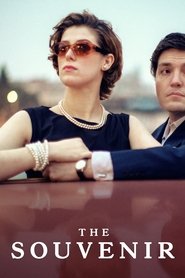The ostensible outline of this quietly understated film follows a shy but ambitious film student who falls into an emotionally fraught relationship with a charismatic but decidedly untrustworthy older man. But that doesn't quite cover the plot, for not only is The Souvenir a film about a young artist who is inspired, derailed and ultimately strengthened by a toxic relationship, but it is also partly a coming-of-age drama, a subtle portrait of class and, finally, a film about the making of a film.
Still, one of the geniuses of this heartbreaking movie is that none of these many elements crowds out the other. It never feels rushed. Indeed, there are many scenes where the camera simply 'sits there' and quietly observes what is going on. Other films might be smothered by references to an 18th-century oil painting too, but The Souvenir somehow evades this as well. And there's a certain ring of credibility to the story, too, no doubt in part due to the fact it is based on director Joanna Hogg's own experiences at film school. A beautifully observed multi-layered film — I just hope the sequel is one-tenth as good.
Note in particular the parallels between the subject of Julie's thesis project and Anthony himself:
Julie meets […] Anthony, in the first film’s first scene, at a party in her apartment where he has come as a guest of a guest. He has dark hair, a cleft lip, a slightly slurred, deliberate voice, and wears a tailored pinstripe jacket. Amid the flat’s silvery surfaces — white walls, white sofa, white mirror — his fluid, louche way of holding himself gives him the look of a spill of wine. In their first conversation, Julie tells him about her thesis project, a tragedy about a young boy living in Sunderland, observing its decline and loving his mother, who, by the end of the film, will be dead. She fiddles with her hands and speaks in long sentences, with the halting clip of a person who is eager to talk but not accustomed to being listened to. Anthony, by comparison, sounds like he hasn’t needed to explain himself to anyone for a very long time.
— Victoria Uren (n+1)
The idea of infatuation as a kind of helpless habit defines Julie’s difficult and yet increasingly desperate attraction. Julie doesn’t indulge in any drugs herself, but Anthony’s constant need for a fix renders her a kind of user by proxy. […] Julie’s willingness to be dominated by Anthony—first conversationally, then sexually, and then financially—is seemingly at odds with her desire to be a film director, a vocation defined by control. Her inability to assert herself fully at her pricey university represents the collateral damage the affair is taking on her mental and physical health. It also suggests that, subconsciously, she’s not necessarily ready to take the reins. […]
— Adam Nayman (The Ringer)

